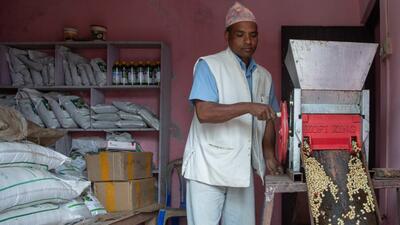
Supporting small businesses on the brink
Small businesses are key to supporting a resilient, sustainable and inclusive economic recovery from the COVID-19 crisis
Small and medium-sized enterprises (SMEs) are key to supporting a resilient, sustainable and inclusive economic recovery from the current COVID-19 crisis.
Across OECD economies, our SME and Entrepreneurship Outlook shows SMEs represent 99% of all businesses, and account for 60% of employment and between 50% and 60% of value added. Moreover, they play an essential social role, operating in markets underserved by larger firms and in social ventures, often as fully-fledged social enterprises.
However, the pandemic hit small businesses hard and pushed many to the brink. Since February 2020 we monitored over 100 surveys held among SMEs in 31 countries for our SME policy responses note, and found that 70-80% of SMEs experienced a serious drop in revenues.
Many were forced to close operations for long periods, and although closure rates improved over the course of the year, at the end of 2020 around one in seven remained closed according to the Future of Business Survey conducted by the OECD, Facebook and the World Bank.

The digital divide
Small businesses were particularly exposed, not only due to their over-representation in the sectors most affected by social distancing measures, but also because they lacked access to the finance, networks, skills and advice needed to adapt to the new environment, in particular digital technologies.
The digital divide was already prevalent before the current crisis, with uptake by SMEs at roughly half that of larger firms. This position is changing rapidly – The Digital Transformation of SMEs shows that since the start of the COVID-19 pandemic, up to 70% of SMEs are making greater use of digital technologies, with many capitalizing on these to reinvent themselves. But the transition has been tough for most and impossible for some.
Governments’ support for small business has been critical, with direct grants, loans, guarantees and tax relief, as well as innovative measures to help them adapt to the new trading environment, including training, advice and information sharing as well as facilitating access to digital tools in partnership with larger companies.
This unprecedented support has helped stave off bankruptcies in most countries. Yet small businesses will feel the impacts of the pandemic for many years to come, and governments will need to unwind emergency measures carefully to avoid triggering a wave of bankruptcies.
Whilst allowing unviable firms to fail will be an important part of the recovery process, many viable firms have built up debts that may push them under or significantly constrain their capacity to invest and grow, which could threaten the recovery.
Governments can support these firms through timely debt restructuring, alternative financing instruments and continued promotion of structural policies to expand small business networks, skills and trade finance for instance, as well as promoting new – digitally driven and more sustainable – business models.

The OECD Centre for Entrepreneurship, SMEs, Regions and Cities has been tracking the policy response, providing forums for exchange and recommendations, including in our Coronavirus note on SME policy responses, our special edition of the OECD Scoreboard on Financing SMEs and Entrepreneurs and the forthcoming OECD SME and Entrepreneurship Outlook.
We now need to leverage our deep experience, networks and evidence base to work with partners to secure a recovery driven by and with small businesses.

















